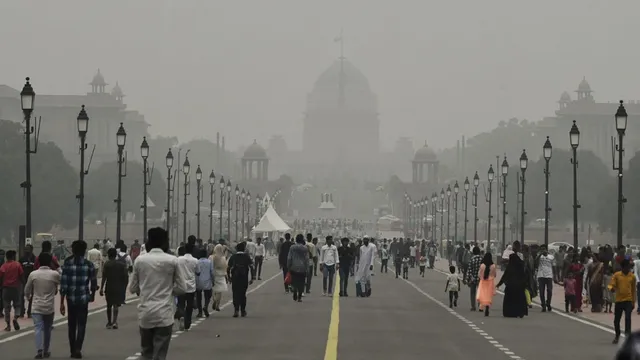- By Imran Zafar
- Mon, 04 Nov 2024 09:24 AM (IST)
- Source:JND
Delhi and the surrounding areas began experiencing mild cold on Monday, with meteorologists predicting a gradual drop in temperatures in the coming days. Despite this seasonal shift, rain is not expected, allowing pollution to persist, leading to a smoggy sky and potentially aggravating respiratory issues. The adverse air quality may cause breathing difficulties, eye irritation and allergies for residents.
Delhi observed its first light fog of the winter season on Monday morning, though the sun is expected to clear the fog by afternoon. Monday’s maximum temperature is projected at 33 degrees Celsius, with a minimum of 17 degrees Celsius, while neighbouring Noida may see temperatures ranging from 18 degrees Celsius to 32 degrees Celsius.
Humidity stands at 23 per cent and wind speed is at 23 kmph. Tomorrow, temperatures are expected to fluctuate between 25.32 degrees Celsius and 32.58 degrees Celsius, with humidity slightly rising to 27 per cent. Meteorologists also stated that colder mornings and evenings are anticipated by mid-November. Daytime warmth, however, is likely to persist due to sunlight.
Meanwhile, the air quality remains in the ''very poor'' category due to low wind speeds and smog, with pollution levels remaining consistently high over the past week. This morning, AQI in Anand Vihar was recorded at 624, marking it the season's worst level so far.
Meanwhile, the overall air quality in the national capital stood at 434 as of 6 am today. The situation is so dire that the current pollution levels in Delhi are 59 times higher than the WHO's recommended safety limit. Prolonged exposure to these pollutants is leading to severe health hazards.
Doctors have cautioned residents, especially those with respiratory issues, to avoid morning walks as pollutant levels peak during this time. The elderly and individuals with chronic conditions are advised to avoid cold water to minimise risks of irritation and to rinse their eyes with cold water if discomfort arises.

